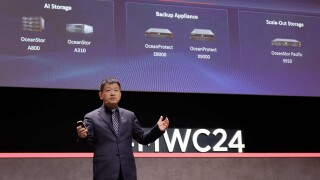|
We were ahead of the crisis,” reflects OTEGLOBE’s CEO, Dino Andreou, with both a hint of pride and sorrow.
On the one hand, Andreou has led OTEGLOBE through a hugely successful and sustained period of growth, which has seen the company increase its revenue by 60% and double its EBIDTA in the five-year period between 2006 and 2011.
On the other, the fiercely patriotic Greek has had to watch while his beloved homeland became the largest casualty of the ongoing Eurozone crisis: “I believe Greece will stay with the EU. I hope my feelings come true, as if we don’t, it will be a disaster.”
OTEGLOBE impressively recession proofed itself by strategically positioning Greece as an alternative hub for subsea cables across the Mediterranean basin, while at the same time extending connectivity to markets in south east Europe and the Balkans.
The company showed impeccable timing in the latter, serving subsidiaries in Bulgaria, Romania and Albania, before many of its peers had realised the potential of these markets. “The market is now mature. I believe there is no room for new network investments, yet someone may expand the existing ones,” he says.
Staying ahead of the curve proved invaluable when the global financial crisis took hold in 2008, particularly as Greece subsequently spiralled uncontrollably into debt. “Between 2007 and 2009, we generated a lot of revenue from our networks. As a result, we were able to pay back the investment to our mother company and didn’t need to borrow from the bank,” says Andreou.
Andreou claims OTEGLOBE’s revenues have not been impacted by the situation in the domestic market. “70% of our revenue comes from abroad. Of course the crisis in Greece is going to impact us at some point, but it will hit only a percentage of our turnover.”
As Greece looks to reduce its deficit, the nation could in fact learn one or two things from OTEGLOBE’s experiences overseas.
“Greece should keep investing in services they can sell abroad,” says Andreou. “When there are problems with your domestic market, you find other markets to go to in regions such as eastern Europe and the Middle East.”
Andreou believes telecoms could also aid the Greek economy’s recovery process: “Relative to other industries, such as real estate or agriculture, telecoms is doing ok in Greece.”
On the hunt for fresh market opportunities
The hunting season began last month in Greece, and during this time of year, Andreou likes to head to the mountainsides of the Greek mainland with his shooting companion, his 11-year-old son, to take aim at partridges and woodcocks.
Andreou also has some very clear targets in mind for the next phase of OTEGLOBE’s expansion. His aim is firmly set on the Middle East and Africa: “We are looking to rapidly invest in connectivity to those regions. And then using our experience and knowledge in the market, help serve the growing traffic volumes.”
Such plans received a major boost earlier this year when the company was able to resume an exclusive partnership with the Libyan International Telecommunications Company (LITC) to build a new subsea cable connecting its landing station in Crete to Libya.
The Silphium cable, which is fully funded by LITC, was initially announced in June 2010 but was put on hold shortly afterwards due to the Libyan Civil War. In a remarkable turnaround, the cable is now expected to be operational by the last quarter of the year, and both companies are presently testing the 10G subsea cable system, which will offer capacities in excess of one terabit.
“We signed the papers. We did the official ceremony in Libya. Six months later, the war started,” Andreou reminisces. “We thought the project was gone. We received a letter from the LITC and stopped everything to wait for developments.”
“As soon as things started to get clearer following the civil unrest, the LITC CEO made it his first priority to get the cable up and running.”
Andreou claims the route will offer the shortest distance between western Europe and north Africa. As part of the deal, OTEGLOBE will also provide the LITC with connectivity to other major European hubs, and Andreou hopes the cable will help further position the company’s Chania International Station in Crete as a new telecoms hub in the Mediterranean.
An alternative hub for the Mediterranean
International voice and data traffic between Asia and Europe mainly passes through the Egyptian fibre-optic corridor, across the Mediterranean basin and connects onto western Europe through established landing stations in Italy and France.
As traffic levels have exponentially grown, pressure has increased on operators to reduce the industry reliance on this route by providing alternative options.
OTEGLOBE’s landing station in Crete, says Andreou, offers one valuable alternative for subsea cables crossing the Mediterranean, particularly from the Middle East. “We can serve the Middle East as the nearest hub on the subsea segment, which is very important to that region,” says Andreou.
The subsea cable segment is one half of Andreou’s plans to establish Greece as a hub. The other is to become involved with the growing number of terrestrial projects springing up across the Middle East region.
Andreou expresses an interest in participating in the Regional Cable Network (RCN), which aims to stretch from the UAE’s Fujairah through Saudi Arabia, Jordan and Syria before ending in Turkey, as well as any other future terrestrial network opportunity.
Both projects have, however, been put on hold due to ongoing conflict in Syria. “Whatever happens,” says Andreou, “because of the geography and the networks that have been developed, we are going be a part of this market.”
Although Andreou sees the development of terrestrial routes across the Middle East as an important development, he concedes they will not radically alter the marketplace: “In my opinion the terrestrial will always be complementary. It may change to maybe 80% [subsea] and 20% [terrestrial] in the future, but the majority will continue to be subsea for the next five years,” says Andreou.
The reason, he says, quite matter of factly, is that all the major players have placed huge investment into the subsea cable routes and won’t want to relinquish that.
African ambitions
Andreou is now hoping to replicate his company’s early to market strategy in the Balkans in Africa. The African market he says remains relatively “untouched”, adding that in the future he believes the traffic volumes from Africa will be as high as what is now being seen in Asia.
Andreou admires the approach of France Telecom-Orange which has aggressively entered Africa throughout this year as part of its Conquests 2015 plan. “I like France Telecom-Orange’s approach. I think they are doing the right thing and are well ahead of the competition – they’re vision was to go to Africa and they went and did it.”
OTEGLOBE, he says, ultimately always strives to stay ahead of the competition: “If you don’t seize an opportunity at the right time, you lose it,” says Andreou.
“We have been lucky and done the right thing at the right time in the past. We made our network investment in the Balkans in 2007, which was ahead of many other players. Imagine, however, our revenues if we had made our investments in 2000.”
“You can still get some opportunity if you follow, but not the full. There is still time to move in Africa,” he adds.
OTEGLOBE
History: OTEGLOBE has been operational since October 2000 and serves as the international wholesale arm of OTE Group.
Ownership: OTEGLOBE is a wholly-owned subsidiary of OTE Group. OTE Group is 40% owned by German incumbent Deutsche Telekom following a deal with the Greek government in July 2011, with the state retaining a 10% stake in the company.
CEO: Dino Andreou has served as CEO of OTEGLOBE since October 2007.
Networks: OTEGLOBE is the only carrier, in the broader Balkans region, which reaches western Europe through Greece with two fully owned geographically diverse dual-path, multi-wavelength networks, the GWEN and the TBN, while it also operates an IP/MPLS network (MSP) with presence in the main telecoms hubs in Europe.
In addition, OTEGLOBE has rights in several regional and transatlantic submarine cable systems, trans-border fibre-optic networks to all neighbouring countries and more than 150 direct bilateral routes.
Services: The company offers a portfolio of transport, voice, corporate and mobile services to international carriers, fixed and mobile operators and multinational organisations, over its extensive network infrastructure.








